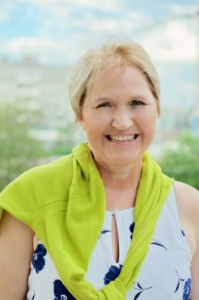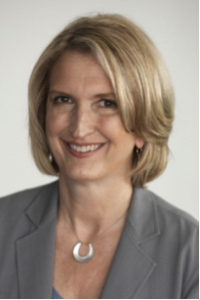 “We got to survive to run the race. So, it is very important that we find mechanisms, and we create support systems to save ourselves along this path.”
“We got to survive to run the race. So, it is very important that we find mechanisms, and we create support systems to save ourselves along this path.”
Kimberly Bryant is the founder and CEO of the Black Innovation Lab and Ascend Ventures Tech. A little over ten years ago, Bryant wanted to see more black and brown girls in computer science, which led to her creating Black Girls CODE to support her young daughter’s interest in coding. Now, she is working on her next set of passion projects; an early startup accelerator to nurture founders in the US South called the Black Innovation Lab in her hometown of Memphis, Tennessee; and a book and advocacy work to support Black women leaders in both the nonprofit and for-profit business space.
“What I wanted to do as a part of the Black Innovation Lab is take all of the knowledge and networks I’ve acquired over the last almost 20 years in the heart and center of innovation back to my hometown to create a space to support founders that come from communities that look like me, and have had challenges, and to show what the pitfalls may be, so they do not repeat some of the mistakes that I made within my career as a leader. It’s to create a solution to finding support and finding supportive spaces where we can thrive as well as maintain that which we create. I really feel that my experiences and my founder journey brought me to this moment, where I can be a mentor, a supporter and advisor to others like me. There has been a recurring theme of mentorship throughout my career both within my previous nonprofit work with Black Girls CODE, and also as a foundation for my work within the Black Innovation Lab and the advocacy work I’ve been doing with other Black women leaders.”
Bryant cites the ‘Black GirlBoss Paradox’ as a crucial phenomenon she has been exploring within her advocacy work alongside other Black women leaders and as part of the OpEd and Equality Now’s Public Voices Fellowship On Advancing The Rights Of Women And Girls. Her efforts to address the ‘Black GirlBoss Paradox’ are focused throughout her written work, research, and the foundation of a future advocacy organization. While distinct from the Black Innovation Lab, these endeavors complement and align with its central themes of equity, inclusion, and empowerment, collectively working toward a more equitable and supportive landscape for marginalized founders and leaders. She describes the ‘Black GirlBoss Paradox’ as the situation when, “black women ascend to a certain level in leadership and they find many obstacles, and many biases around our ability to lead and hold power in current infrastructures.”
Bryant continues, “when I experienced challenges within my leadership journey I was surprised by the number of other Black women who reached out to me publicly and privately to share their similar experiences. I believe we have a crisis with respect to Black female leadership and need transformative change to the nonprofit and for-profit systems which have been a barrier to our ability to thrive and grow in these spaces”.
Bryant is a trailblazer, altruistic and focused on real change. She hopes that future generations of women leaders will be given the opportunity to have safe learning experiences. She recognizes that systemic change may not happen overnight, but as more support is built through organizations and we speak truth to the gendered and racialized biases which exist in our systems today, there will be change over time.
“I want something different for the next generation. Where they are actually given just as much opportunity and chances as their male peers and there is true equity of opportunity in the world to both succeed, fail, and get back up and try again.”
The Significance of Black Innovation Lab – A Continuation of a Legacy
Bryant speaks more about her current project, the Black Innovation Lab, and her hopes for how it will support and empower marginalized entrepreneurs. In Bryant’s words: “I wasn’t looking to come home to build a startup accelerator as much as I was looking for ways to support and nurture other founders and creators such as myself and I wanted to do more than just give advice; I wanted to be able to write a check. There is no lack of talent in the startup economy–however what is not equitable is the access to opportunities and I hope to plant seeds to address this gap with a focus on the US South.”
Kimberly Bryant’s journey as the founder and CEO of the Black Innovation Lab is deeply intertwined with her legacy of community work, particularly her role as the visionary behind Black Girls CODE. Over a decade ago, Bryant’s mission was to create pathways for black and brown girls to excel in computer science. Today, that mission continues to evolve, expanding into the creation of the Black Innovation Lab—a natural extension of Bryant’s dedication to community empowerment. This new venture isn’t just a departure for Bryant; it’s a growth and a commitment to providing resources, mentorship, and opportunities to underrepresented tech founders who often face systemic barriers.
Memphis, nestled in the heart of the US South, is the perfect canvas for this venture. The region is teeming with untapped potential and burgeoning talent waiting to be nurtured. By establishing the Black Innovation Lab in Memphis, Bryant is sowing the seeds for a vibrant startup ecosystem to flourish in the South.
For Bryant, it’s a heartfelt homecoming—a return to the city that raised her. Memphis is where her journey began, and it’s where she now intends to make an indelible mark. As the Lab takes root on the historic grounds of the former HBCU Griggs College, she hopes it will serve as a reminder that innovation knows no boundaries. It signifies a full circle moment—an opportunity to bring transformative change back to the place that helped shape her.
Making Space to Learn from Mistakes
Learning from mistakes can be an invaluable experience for leadership growth, if only given the space to make them and bounce back. Bryant points out, however, that women are not given that grace to the same amount as their male peers.
“Women in leadership, and Black women in particular, are seldom afforded the space to acknowledge and recover from their missteps. While we, as leaders, can grow from our errors and find the resilience to get back on course, there exists a pervasive expectation of perfection that disproportionately affects us. It’s a notion we must challenge because male leaders routinely receive second chances, and organizations often cushion their landings. This safety net is seldom extended to women in leadership roles, forcing us to fight tenaciously to reclaim our positions.”
One valuable lesson Kimberly Bryant gleaned from her own journey was the profound importance of trusting her instincts when making pivotal decisions. She reflects, “Far too often, I allowed my rational mind to undermine the decisions I needed to make. Our intuition and the insights we derive internally from these signals hold tremendous power. We mustn’t allow our logical minds to dissuade us from the choices we should pursue. There’s a popular business adage, ‘trust but verify,’ but I propose a modification: ‘verify first, then establish trust.’ If something or someone feels amiss, it’s crucial to trust your instincts and exercise caution.”
Making Space for Serendipity
Bryant reflects on what it means to be a trailblazer and the importance of taking care of oneself as an innovative leader, particularly as a woman of color.
“You absolutely can be what you don’t see in the world because that is what innovators do. So, if you transfer innovators with trail blazers, that’s what trailblazers do — they see a need in the world, and they find a way to fill it. And I think that the need for each of us that are called trailblazers is unique.”
As a trailblazer and founder, Kimberly Bryant recognizes that, “the endurance piece of being a leader and being able to get to that end goal and not have lost all of yourself, is extremely important.”
In that vein, she rejects the trope of the “strong woman”, as she says, “that needs to be put away in the filing cabinet and not used as a badge of honor because I think it’s important for us to realize that the body keeps the score. The position to ‘warrior’ through some challenging times, it catches up with you, and it catches up with the body.” She hopes to set a different pace in this next part of the road in her career and make time for creativity and space for serendipity.
One of the passions that Bryant has in mind when she talks about making space for serendipity is gardening. She describes gardening as “”a means to re-engage with the natural world, to immerse oneself in the process of nurturing life. It’s about celebrating successes and learning from failures, all while maintaining a profound connection with the earth. My garden is more than just soil and plants; it’s my sanctuary—a place of both respite and revival. Over the past few years, I’ve come to realize that tending to my garden has been a source of profound healing and renewal, a lifeline that has helped me navigate life’s ups and downs.”
It seems a fitting hobby for Bryant who has dedicated her career to growing as a leader and nurturing others along the way.


